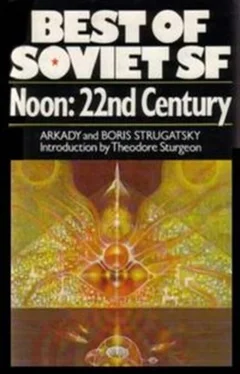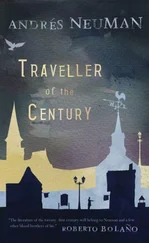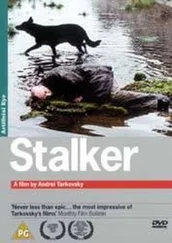“I’d still like to know who it is,” the controller said between his teeth.
“You’ll find out soon enough,” the assistant said enviously.
The ducks unexpectedly took to the air and darted forward in a sparse flock, beating their wings as hard as they could. The clouds began to whirl into a funnel, and a tornado of water and steam began to rise from the middle of the plain. The hills disappeared, the pond disappeared, and scrawny uprooted bushes rushed off into the clouds of turbulent haze. Something dark and enormous showed for an instant in the spreading mist, something flared with a scarlet glow, and they saw a hill in the foreground tremble, distend, and slowly flop over, like a layer of turf under the share of a powerful plow.
“My God!” said the assistant, his eyes glued to the screen. But by now he could see nothing except the fast-spreading white and gray clouds of steam.
By the time the helicopter had landed, a hundred yards from the edge of the enormous crater, the steam had dispersed. In the center of the crater the nuclear vessel lay on its side, the thick posts of its reactor rings jutting stupidly and helplessly into the air. The steel-blue hulks of the emergency robots, half-buried in hot mud, lay nearby. One of them slowly drew its mechanical paws back under its armor.
Hot air shimmered over the crater.
“Doesn’t look good,” someone muttered as they were getting out of the helicopter.
Overhead, rotors softly whirred—more helicopters rushed through the air and landed close by.
“Let’s go,” said the controller, and everyone straggled out after him.
They went down into the crater. Their feet sank up to the ankles in the hot slush. They did not see the man at first, but when they did see him, they all stopped at once.
He was lying face down with his arms spread out and his face buried in the damp ground, pressing his whole body into the soil and trembling as if from severe cold. He wore a strange suit, crumpled and seemingly chewed up, of unusual cut and color. The man himself was red-haired, vividly red-haired, and he did not hear their footsteps. When they ran up to him, he raised his head, and everyone saw his face, blue-white and dirty, slashed across the lips by an unhealed scab. The man must have been crying, for his deepset blue eyes sparkled, and there was mad joy and suffering in those eyes. They picked him up, grasping him under his arms. Then he spoke.
“Doctor,” he said faintly and unclearly—the scab crossing his lips hindered his speech.
At first no one understood him—it was only after several seconds that they realized he was asking for a medic.
“Doctor, hurry. Sergei Kondratev is in bad shape.” He shifted his wide-open eyes from one face to another and suddenly smiled. “Hello, great-great-grandchildren.”
The tension of the smile made the wound on his face open up, and thick red drops hung on his lips. Everyone had the impression that the man had not smiled for a long time. People in white coats hurried down into the crater.
“Doctor,” the redhead repeated, and collapsed, his dirty blue-white face slumping back.
The four inhabitants of Room 18 were widely renowned within the confines of the Anyudin School, and this was only natural. Such talents as consummate skill in the imitation of the howl of the giant crayspider of the planet Pandora, the ability to discourse freely upon ten methods of fuel economy in interstellar travel, and the capacity to execute eleven knee-bends in a row on one leg could not go unnoticed, and not one of these talents was foreign to the inhabitants of Room 18.
The history of Room 18 begins at a point in time when the companions were only three in number and still lacked both their own room and their own teacher. Even in those days Genka Komov, better known as the Captain, exercised unlimited authority over Pol Gnedykh and Aleksandr Kostylin. Pol Gnedykh, familiarly known as Polly or Lieber Polly, was famous as an individual of great cleverness of mind, an individual capable of anything. Aleksandr Kostylin was of unquestionable good nature, and covered himself with glory in battles associated with the application not so much of intelligence as of physical force. He could not endure being called Kostyl for short (and understandably so, for “kostyl” means “crutch”), but he willingly answered to the nickname of Lin. Captain Genka, who had mastered to perfection the popular-science book The Road to Space , who knew many various useful things, and who was, to all appearances, easily capable of repairing a photon reflector without so much as changing the spacecraft’s course, indefatigably led Lin and Polly toward reknown. Thus, for example, wide celebrity resulted from the tests of a new type of rocket fuel that were conducted under his direction in the school park. A fountain of dense smoke flew up higher than the tallest trees, while the crash of the explosion could be heard by all who were on the school grounds at the right moment. It was an unforgettable feat, and long afterward Lin still sported a long scar on his back, and went shirtless whenever possible in order that this scar should be exposed to the gaze of envious eyes. This too was the threesome that revived the pastime of ancient African tribes by swinging from trees on long ropes simulating lianas—simulating them inadequately, as experience demonstrated. Moreover, it was they who introduced the practice of welding together the plastic of which clothing is made, and they repeatedly utilized this ability to temper the unbearable pride of the older comrades who were permitted to go swimming with face masks and even aqualungs. However, while all these feats covered the threesome with glory, they did not bring the desired satisfaction, and so the Captain decided to participate in the Young Cosmonauts’ Club, which held forth the brilliant prospect of riding the acceleration centrifuge and perhaps even of winning one’s way at last to the mysterious cosmonautical simulator.
It was with great amazement that the Captain discovered in the club one Mikhail Sidorov, known for various reasons also as Athos. To the Captain, Athos initially appeared to be an arrogant and empty-headed individual, but the first serious conversation with him demonstrated that in his personal qualities he undoubtedly surpassed one Walter Saronian, who was at that time on reasonably affable terms with the threesome, and who occupied the fourth bunk in the just-assigned Room 18.
The historic conversation proceeded in approximately this wise:
“What do you think about nuclear drive?” Genka inquired.
“Old hat,” quoth Athos shortly.
“I agree,” the Captain said, and he looked at Athos with interest. “And photon-annihilation drive?”
“So-so,” said Athos, shaking his head sadly.
Genka then put to him the premier question: which system seemed more promising, the gravigen or the gravshield?
“I acknowledge only the D-principle,” Athos declared haughtily.
“Hmm,” said Genka. “Okay, let’s go to Eighteen—I’ll introduce you to the crew.”
“You mean your crummy roommates?” Athos-Sidorov winced, but he went.
A week later, unable to endure intimidation and open violence, and with the teacher’s permission, Walter Saronian fled Room 18; Athos established himself in his place. After that the D-principle and the idea of intergalactic travel reigned in the minds and hearts of Room 18 firmly and to all appearances for good. Thus was formed the crew of the superstarship Galaktion : Genka, captain; Athos-Sidorov, navigator and cyberneticist; Lieber Polly, computerman; Sashka Lin, engineer and hunter. The crew moved forward with bright hopes and extremely specific plans. The master blueprints of the superstarship Galaktion were drawn up; regulations were worked out; and a top-secret sign (a special way of holding the fingers of the right hand) by which the crew members might recognize one another was put into effect. The threat of imminent invasion hung over the galaxies Andromeda, Messier 33, and others. So went the year.
Читать дальше












